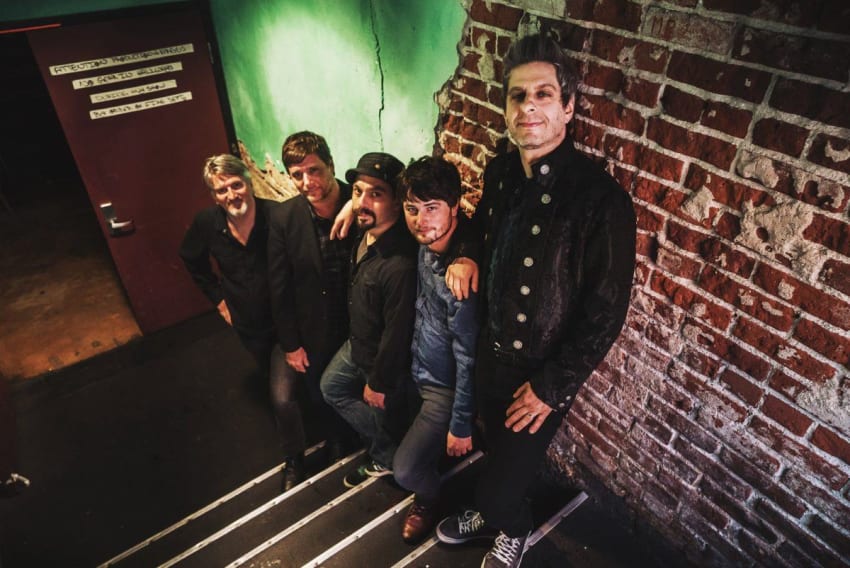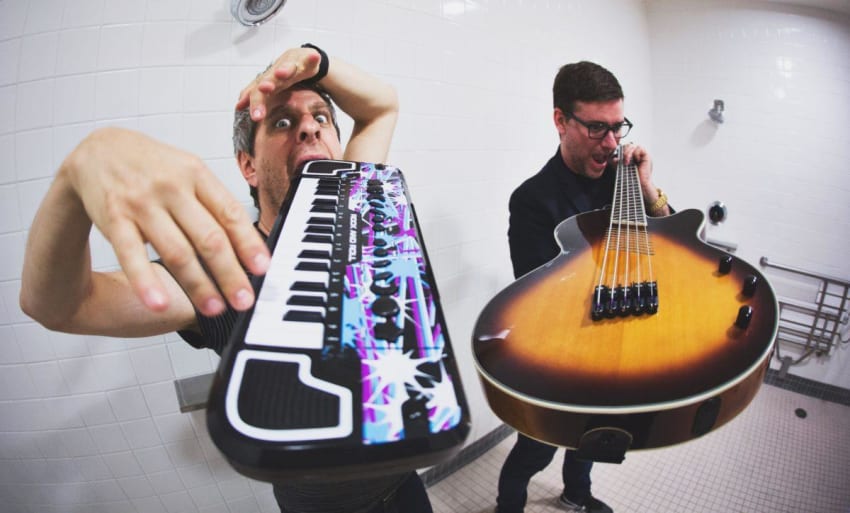Overstepping Into A Tiny Little World: An Interview With Bassist Mike Gordon
By Chad Berndtson Nov 15, 2016 • 2:00 pm PST
Words by: Chad Berndtson
Mike Gordon’s one of those creative types who’s always percolating — you have to wonder if he’s ever really at rest. No sooner did Phish wrap a successful fall tour with a blowout Las Vegas run than Gordon’s setting out for a 15-show run with his own band, one that’ll feature its first return to Nashville in five years and a three-night underplay at The Sinclair in Cambridge, Massachusetts.
It’s been two years since the band’s last studio effort, Overstep and Gordon and team — guitarist/singer Scott Murawski, drummer John Kimock, percussionist Craig Myers and keyboardist Robert Walter — are itching to record again. Expect some new songs and a few experiments on the coming tour says Gordon, who briefly joined us to look ahead as well as back at the very Phishy Vegas run just passed.

JAMBASE: In 2015 you changed the lineup of your band after nearly a decade. Has it worked out as you’d hoped?
Mike Gordon: Yeah, it’s really been great — beyond expectations. Both of those guys are uniquely talented and diverse. For me, diverse kind of means being able to reach back into different style with their playing in a way that’s going to help us forge into the future. They’re deeply grooving, but innovative, and sonically, that’s what we wanted.
JAMBASE: Were you looking for something specific or were you looking to define it based on what these guys would bring as the players they are?
MG: That was something I was looking for, that range. It’s complicated and all I can probably do is simplify it. There’s a mess of things that I would look for, musical and otherwise, but one thing I look for is how someone takes a really simple pattern — and there are so many simple patterns we would use in a band, any band — and do it in interesting ways. That just seems like the hardest and most rewarding thing, rather than go in and go crazy to be innovative, it’s finding the ways to be close to the roots. And so with those guys they do that with flying colors.
JAMBASE: Is there a song in the current repertoire that’s a good example of this? Something you guys play often that to you is a good showcase for what you’re describing?
MG: What came to mind is “Tiny Little World.” We’ve been leaning on the Overstep songs for a while, and now we have new songs in the works, but that’s an example of how songs tend to shift around and become what they want to become. That [song] was supposed to be punk or the closest I’d come to like The Clash or something, but then it shifted right away to lean toward R&B and it was the first time I’d used that synth pedal, the Deep Impact, in the studio. The guys have found a way to weave in these textures that you can’t really define as a genre, that’ll happen in the jam.
Recently we were touring with “Morphing Again,” which is from 2008, but trying not to make it sound as much like a jam band, in whatever way makes sense. We do that by paring some things down, taking some things away, changing some chord progressions, and it still ends up sounding like the same songs — these things can be subtle, the textures of sound on groove. That’s a monumentally important thing. But it’s all a work in progress for me. We had some rehearsals in September and they were really good. Sometimes it’s slowing down the tempos, just spending time so we’re not glossing over the rhythms but getting to the inner fabric of how the grooves are working. We recorded it. I’ve been listening through the rehearsal versions. We have a website where we can all reference our own versions and we take the definitive ones. It’s just kind of interesting to me to have this all be a work in progress to get better and better and better. It’s a constant discovery for me.
JAMBASE: How do you approach describing these things and making these suggestions to someone like Scott, with whom you’ve played for decades, vs. the newer guys in the band?
MG: That’s a good question. It has to come from a place of respect. I don’t want to be foreboding as a bandleader. I don’t know the answers, and that’s often what I say first. I bring my gut feelings. I say, “Let’s slow this down because it felt too fast.” And then other people chime in and maybe they agree or maybe they read that they think I haven’t pinpointed the problem exactly, making it kind of a collaboration. Everyone has different kinds of comments. With Craig, it’s something that has this intuition that really is intuition. It doesn’t mean that any of us, including me, will have the right answer that will work. With Scott, I think he probably understands groove better than I do in many ways. He’s so rhythmic, and he plays drums, et cetera. And Robert makes movie soundtracks and plays with all these incredible gadgets and apps to make texture. So I trust them. I like to give people artistic license. I say “Can this sound less like a jam band?” But make it broad and give artistic license and share creativity.
I get bored when I get a sense that here’s a band that has one person calling all the shots. You can have a band of incredibly creative people, but not having more than one creative force? We were heading down to the Catskill Chill Festival and I was in the car with Robert and he has the most incredible Spotify playlists. One of them is movie soundtracks, one of them is jazz and blues. I get so inspired because it’s more than getting turned on to artists, it’s getting turned on to entire genres I haven’t been thinking about.
That’s usually how it goes. Sometimes problems happen more than once, but I like to approach it from that angle: let’s solve the problems, let’s let the muse take over. When the inhibitions aren’t there, music can do its thing. That’s why I like to be a problem solver — I like to push the top end of possibility. I’ll get all fired up and be walking down the street and text Scott and say, “If we do it this way, we can fly to the moon in this situation here!” I get revved up. As for how it’s going to happen, I feel like it’s a messenger from the muse, or something.
JAMBASE: You’ve mentioned “not sounding like a jam band” a few times now. Do you think there’s a generic jam band sound?
MG: Yes. But over the years I’ve also found the importance of accepting. A groove or a chord progression can get really old for me, but you know, “I’m going to accept this, I’m going let this seep through my body.” And I can enjoy it. There aren’t any hard and fast rules, and it changes over the years. In Phish it used to be taboo to play certain things because they sounded too much like the Grateful Dead. But then that changed. For me, there are a couple of grooves that are sort of fast and syncopated and feel overly syncopated. There was a Phish soundcheck recently where there was a suggestion for a progression and Trey noted the way everyone was syncopating sounded like Jam Band 101. I like bands that jam, but what he meant was that it’s unanchored, with everyone playing between the bears and no one playing simply and grounding it. That’s what I mean in terms of grooves — nothing heavy, and everyone is sort of swimming in syncopation and everyone is filling all of the holes.
There are chord progressions that sometimes we’ll avoid. If there’s, for example, the one chord, then seven chord, then four chord, which is a million songs we’ve heard — like “Can’t You See” by Marshall Tucker — we might avoid it. But then Phish doesn’t avoid it and we have jams that have that progression that have been life-changing, recently.
I do these things to adjust my own attitude. I want to feel like I’m on the cutting edge, and maybe that’s a little game I play with myself. Other people might not find the same thing boring. As a tangential example, we went to see The Beatles Love show in Vegas, me, my wife and daughter. A lot of Beatles songs I’d stopped listening to because I’ve heard them too many times — they don’t register. But with the multi-track tapes, they took out the music and left vocals or something, and if they’d play it sometimes like you’d hear it on the album, you’d hear it in a new way. “Here Comes the Sun” — the “sun, sun, sun, here we come” part, they had a long intro just with that part and with the sitar, and it went for minutes, and I thought, isn’t this cool?
You climb inside one part of the song, the bridge, and you bask in it. To be able to do that, in terms of improvising in a jam and going onto the next thing, you’re saying let’s take this little bridge and let it be stretched out and improvised. We can bask in it and enjoy it. Sometimes it’s the subtlest tweaks like that. It’s not major open-heart surgery, it’s little tweaks. But it’s important to me. If it all sounds the same, an entire repertoire starts to sound old even if it’s not old.

JAMBASE: Will you be playing new songs on this upcoming tour?
MG: We keep sprinkling in the new. There’s a big bulk of stuff we’re working on that we want to record, but there are a couple new originals and a couple new covers that we’ve already been playing. My first inclination would be to play a lot of new originals and covers. But what I’ve kind of learned is that if we keep the repertoire a little bit smaller and try to do more with it by making things sound better and stretch, and have some new things, but not an overwhelming amount, it’s good.
JAMBASE: Will you be looking to record next year you think?
MG: Right now we’re just sort of thinking about producers. I hate to talk about it so much because then it will be a let down but it takes so long to find the producer and start recording and get the schedule in. For me, the quicker the better.
JAMBASE: Fair enough. Mike, I’d be remiss if I didn’t ask about Ziggy Stardust and Phish’s Vegas run. Did that go the way you guys hoped?
MG: Yeah, definitely. As I wrote in the Phish bill, it’s not an album I had grown up with like the other guys had. So coming into it as more of an outsider, it was a whole world to discover in there — it was more being influenced like a kid would be now, a different attitude [approaching] what Bowie was bringing. We all practiced for it, and it felt really good.
JAMBASE: Do you have a highlight from Phish tour this year? What stands out?
MG: Vegas. On my hotline that’s what people are talking about. Nothing else stood out for me, really. I liked the first show. Vegas. It worked really well.
Loading tour dates


